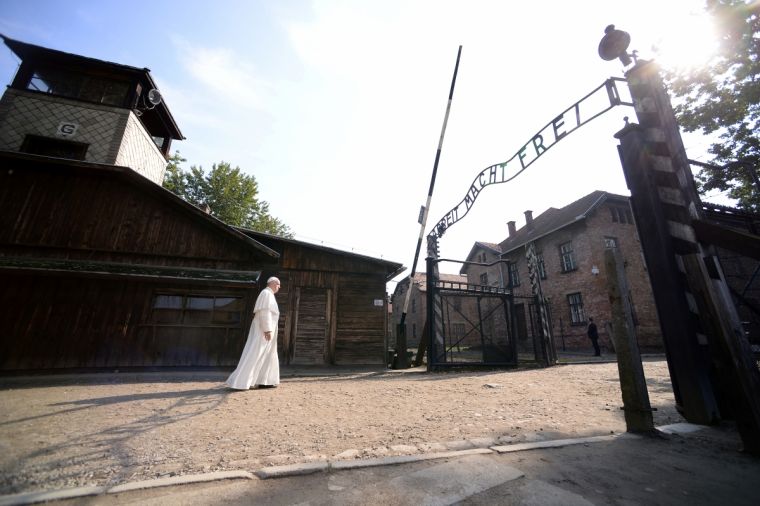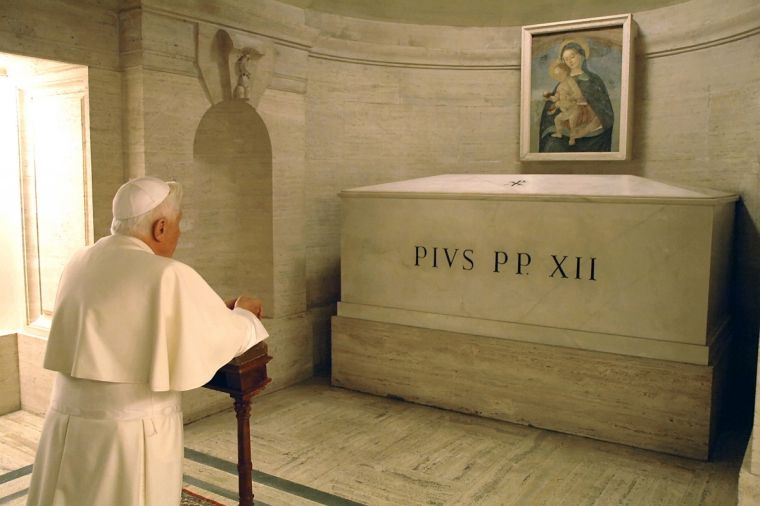BBC Admits To Unbalanced Report On What Wartime Pope Did To Save Jews

The BBC has admitted a report that accused the Catholic Church of "silence" in response to the fate of the Jewish people under the Nazis was unfair.
A BBC's editorial complaints unit has admitted a reporter had not given "due weight to public statements by successive popes or the efforts made on the instructions of Pius XII to rescue Jews from Nazi persecution, and perpetuated a view which is at odds with the balance of evidence."
The offending report on a visit by Pope Francis to Auschwitz was broadcast on the 6 o'clock news on BBC One.
The reporter commented: "Silence was the response of the Catholic Church when Nazi Germany demonised Jewish people and then attempted to eradicate Jews from Europe."
The reporter claimed that Pius XII, Pope during the Second World War, had been accused in a book by John Cornwell, Hitler's Pope, of silently acquiescing to the Holocaust in which six million Jews were murdered.
Cornwell has since moderated some of his allegations. However, the author issued a strong denial to Christian Today that he had "reneged" on his thesis and robustly defended the title of his book, Hitler's Pope.
Lord Alton of Liverpool, an Independent peer and chairman of The Christian Heritage Centre, filed a formal complaint to the BBC, along with Father Leo Chamberlain, former headmaster of the top Catholic private school Ampleforth.
The BBC has now admitted that the item was unfair.
In a Crux Now blog post criticising the BBC report, Lord Alton said that some historians had actually praised Pope Pius XII for his wartime actions.
For example, Jewish historian Pinchas Lapide has written that Pius "was instrumental in saving at least 700,000, but probably as many as 860,000 Jews from certain death at Nazi hands." The Vatican also intervened to help Jewish people escape persecution in eastern Europe, gave them baptismal certificates and hid them in Vatican City.

Lord Alton writes: "Ironically, part of the BBC report came from St Maximilian Kolbe's cell at Auschwitz.
"St Maximilian, was executed after taking the place of another prisoner. He had been arrested for publishing a denunciation of the Nazis in his magazine, Knight, which had a circulation of around one million people.
Hardly silence, then."
In addition, more than 6,000 Polish people, nearly all Catholics, have been officially recognized in Israel as "Righteous Among the Nations" for their role in saving the lives of Polish Jews.
Lord Alton writes: "One charitable interpretation of the Auschwitz report was that it was a sloppy, lazy, throw-away remark - indicative of the sort of religious illiteracy that can cause so much offense; and part of a blurring between the straightforward reporting of news and the desire to add some melodrama to spice it up. Don't let facts or truth spoil a good story.
"Less charitably, the BBC report may be seen as simply the latest example of a long-running attempt to rewrite history."
Alton also notes that in 1931 there were about 21,000 Catholic priests in Germany. More than 8,000 of them, one third, clashed with Hitler's Third Reich and hundreds were "eliminated".
After the War, Pius was thanked by survivors of the Holocaust and there were tributes including from Israel's first President, Chaim Weizmann, and Isaac Herzog, Chief Rabbi of Israel. Rome's Chief Rabbi, Israel Zolli, became a Catholic and took the Pope's name as a tribute to him.
St Maximilian wrote: "No one in the world can change truth, and beyond the hecatombs of the extermination camps, of what use are the victories on the battlefield if we are defeated in our innermost personal selves."
Lord Alton concludes: "In this 'post-truth' era, perhaps every broadcaster and reporter should have Kolbe's words placed above their desks."
Cornwell denied that he had reneged on his thesis in his book.
In a comment to Christian Today, Cornwell said: "There is absolutely no doubt that Pius XII was mainly silent on the Holocaust throughout the war, or, that when he did speak, he veiled his utterances in anodyne, diplomatic language.
"It is not at all clear that all the clandestine initiatives to save the lives of Jews were the direct acts of Pius XII. It would seem that his defenders have been taking credit on his behalf, for the courageous acts of many individuals; which may in time do him no favours in the judgment of history. For example, there is evidence in Professor Susan Zucotti's book, Under his Windows, that Pius ordered a seminary to desist in taking in Jews for fear of reprisals.
"As for the line about me and my book: the focus of the thesis of Hitler's Pope is principally about the relationship between Pacelli, as Secretary of State to the Holy See, during the 1930s.
"In that role Pius XI delegated to him the Holy See's diplomacy with Hitler and the Nazis. In 1933 he negotiated at treaty with Hitler, over and above the German bishops, which traded protection of Catholic schools and worship for withdrawal from Catholic social and political action.
"At the same time, he urged that the Catholic Centre Party should vote for the enabling act that gave Hitler his dictatorship, and immediately afterwards oversaw the the disbanding of the party. It was the last democratic party in Germany. I have also noted that during the days in which Pacelli accepted more funding for schools, teachers, and buildings, Hitler was withdrawing educational benefits from Jewish schools and expelling Jewish academics.
"This goes to the heart of the title of my book. The irony of the phrase Hitler's Pope is this: it does not mean that Pius was in favour of Hitler and the Nazis. In fact, had he been a Nazi and favoured Hitler, he would have been despised just as were the Nazi German "Brown Bishops", and had little effect. As it was, his actions in 1933 demoralised a Catholic German opposition, scandalised the youth, and gave Hitler credit in the eyes of the world.
"After the treaty, known as the Reichsconcordat was signed, Hitler himself told his cabinet that the Holy See had given a boost to Nazi ideology and its solution of the Jewish problem.
"I have by no means reneged on the thesis of Hitler's Pope. What I have said, and it was more a new emphasis on what I had already expressed, is that Pius XII had little scope for publishing criticisms of Hitler. The fact is, Pius or Pacelli had already done the damage that earned him the soubriquet Hitler's Pope."
Christian Today has reached out to the BBC.











